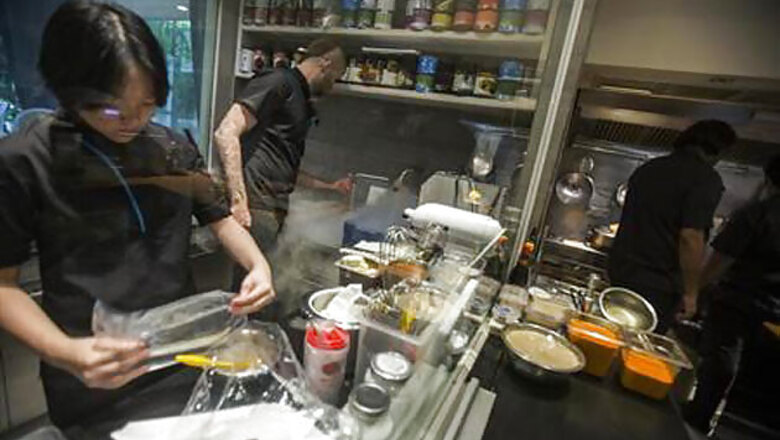
views
Chennai: A successful chef is one who not only whips out lip-smacking dishes but who is also business savvy, a five-star hotel chef says.
"Cooking good food is one part. The other part is that a chef should have good business sense to wow a guest without losing sight of the restaurant's top/bottomlines as well as its brand equity," Chandan Taneja, chef de partie at The Taj West End, told IANS here.
According to young Taneja, he would not turn away a customer but would always try to meet his needs while matching the business goals.
"It is a question of offering the number of items and the number of pieces in the case of non-vegetarian dishes," Taneja who manages the show at the Masala Klub restaurant at The Taj West End said offering a range of appetisers.
The Masala Klub is an Indian cuisine restaurant that offers the traditional North and South Indian dishes but much lighter on the stomach.
"It is not that Indian cuisine has suddenly become unhealthy. People's lifestyle has changed and hence the cooking process is slightly tweaked to make it lighter with less fat content," Taneja said.
For instance, instead of adding butter at the start in chicken butter masala, a lesser quantity of butter could be added towards the end, he remarked.
Taneja is at the Beyond Indus restaurant at the Taj Club House to offer the guests a chance to devour the delicacies of Masala Klub at a 10-day food festival that started June 12 and will run till Sunday.
The sea bass marinated with deggi mirch and pepper was very tender and slipped down the throat while the sandalwood smoked galouti kebab too melted in the mouth.
However what is unbeatable is the bhatti ka jhinga (prawns steeped in spices and grilled on embers), a speciality from Amritsar.
Vegans who would like to have a dish resembling a non-veg item can go for the tasty tandoori angrezi ke phool (broccoli florets imbued with mustard and pickling spices, char-grilled).
Hailing from a business family in Punjab Taneja wanted to make a mark on his own rather than getting into the family's dairy business.
"My cooking journey actually started in our farm located a couple of kilometres away from our home. One day my brother and I went to the farm where we had a small room with a gas stove. Normally there would be our farm hand staying there," he mused.
On the day of their visit the farm hand had gone elsewhere and there was nothing in the room to eat.
"I collected some vegetables from our land and made a dish and roti with the wheat flour in the room. It was edible," he said.
Meanwhile the main course items started arriving on the table along with Indian breads and steamed rice.
This time again, a prawn dish, anardana jhinga (giant-sized prawns tossed on a griddle with roasted coriander seeds and Kashmir chillies topped with pomegranate seeds) makes a person crave for more.
Chicken lovers can go for chicken tariwala (age-old recipe of farm fed chicken made with home ground spices and finished with coriander leaves) which is equally good.
Vegetarians can choose from palak papad ke kebab (a combination of veggies, rolled and fried), paneer khatta pyaz (a delicate combination of cottage cheese with pickled onions, brought to a pleasing pungency with freshly pounded spices), tawa babycorn simla mirch (a colorful combination of baby corn tossed with bell peppers), nadru aur singhada (water chestnut and lotus stem curry) and others.
According to Taneja, a chef's profession is more challenging now than ever before with the advent of the Internet and knowledgeable guests.
"That aside, competition is also increasing with several fine dining restaurants cropping up. The challenge is to get the guests back again in the restaurant," Taneja who has invented the aloe vera halwa sweet dish, remarked.
The baked anjeer halwa (mashed figs topped with thickened milk, baked and served hot) would certainly make you to ask for more.
A meal for two would cost around Rs.3,000-3,500.




















Comments
0 comment